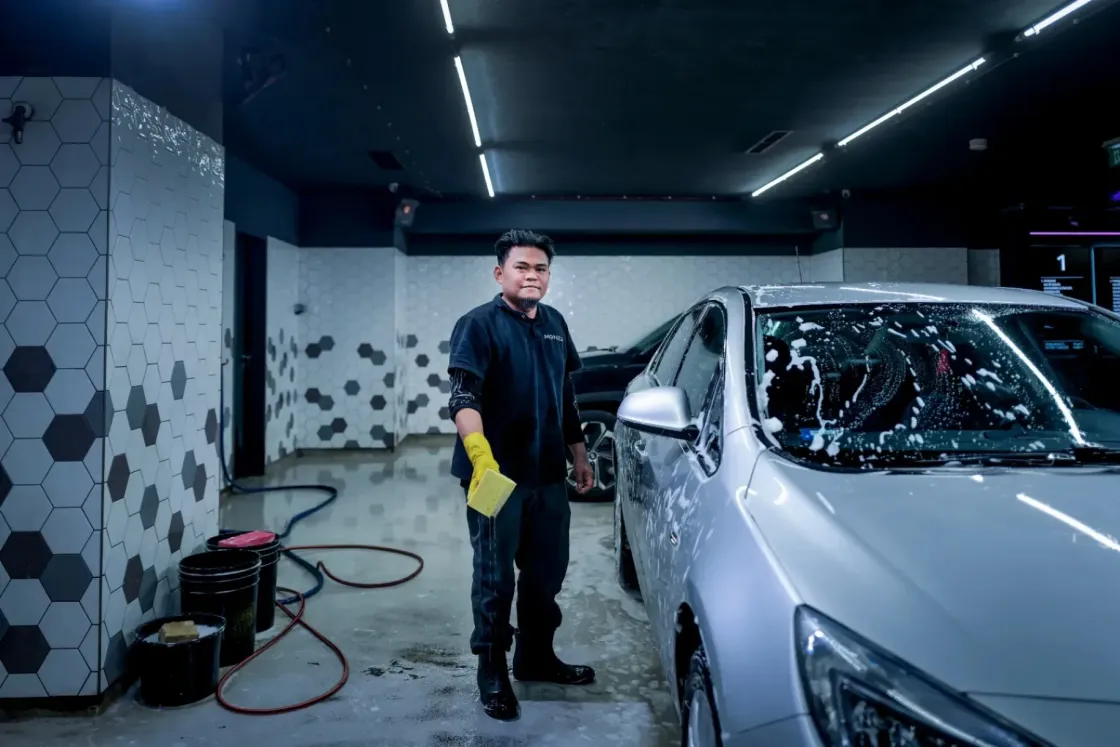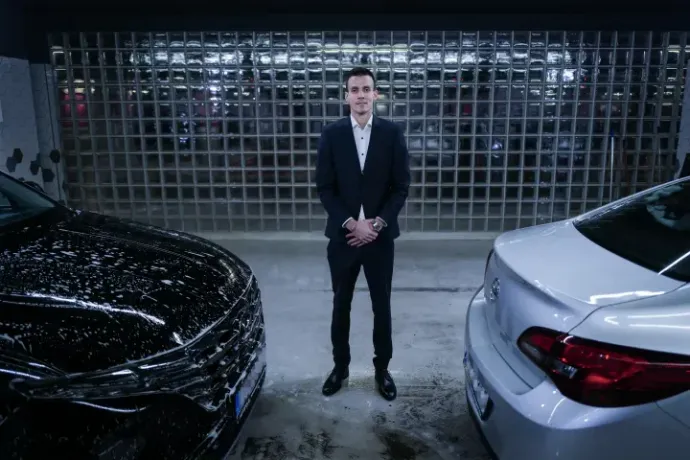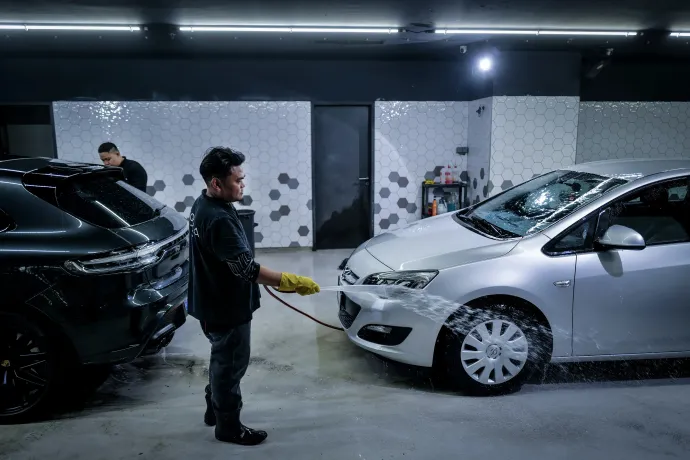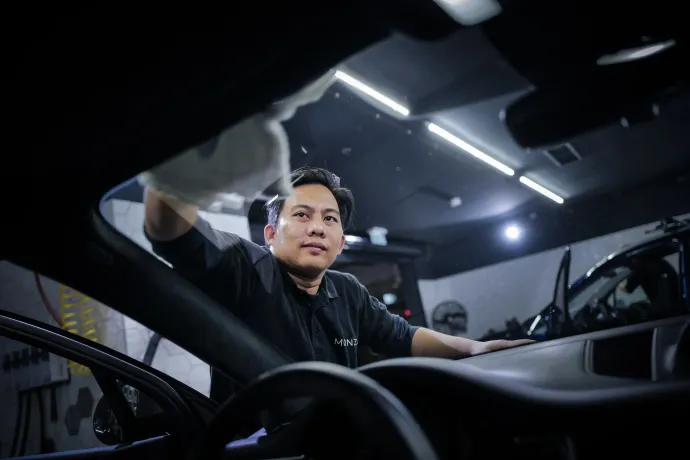Only one in ten Hungarian applicants do the job well, so a Budapest car wash is building motorists' confidence with Filipinos

It’s 10 am, and as a team of seven sets out to clean the interior and exterior of four cars in the brightly lit corner of the underground car park of Budapest’s Etele Plaza mall, chubby clouds of foam float in the buckets filled with warm water. Over the constant noise of the machines, they exchange a few words at most. Instead, the communication between the three Hungarian and four Filipino employees of the Monza car wash is built on simple hand signals and permanent smiles. Proficient in the tricks of removing winter grime, their gloved hands work fast wiping down the windows, scraping mud from the hidden corners of the bodywork and then, once the car's exterior is finally clean, spray it dry with compressed air.
In an immaculately tailored suit, Tamás Varga stands off to the side, watching his men. It was in August this year that, for the first time in seven years, he dared to take a few weeks off, after realising that he would otherwise break down as he still gets called in at weekends. Getting here has been a long road. He originally trained as a pilot, then opened his first car wash in Pest thirteen years ago, and now runs a business with eight locations throughout the capital. It's a small company, so it's up to him to hop in the car and solve the various difficulties that arise.
By the time he had had enough of constantly being on standby, and realized that it had begun to eat away at his personal life, he had become thoroughly familiar with the background of most people applying for the moderately demanding manual work of cleaning cars. There is a huge turnover in the sector, so he has regularly advertised online since the very beginning. In fact, he doesn't have another choice, because there's always someone leaving, while others have to be fired. This is why so far, they have had a total of 600 people come through the 40-strong workforce at Monza's Car Wash.
Tamás tells me to trust him when he says that the majority of Hungarian applicants usually turn out not to like working. Only one in ten applicants ends up being suitable, which not only puts pressure on his nerves, but also poses a risk to the company's Google ratings.

A couple of weeks ago, two applicants deceived him when they promised to start work on the agreed-upon day at opening time. In the end, neither of them turned up ever again, and this sort of thing is quite common. Tamás also identified it as a threat when someone was found to be regularly drinking alcohol at work. There have been minor and major thefts and other incidents as well, so they couldn't avoid installing security cameras, but one doesn't run car washes so they can spend their day watching the footage.
For many people, their car is a little bit like a home, an intimate space they don't just want to let anybody into. This is why Tamás considers someone entrusting them with the full cleaning of the car's interior and exterior – which takes about half an hour – a matter of confidential trust. There was a certain degree of risk to adding staff from the Philippines to the ever-changing team. However, given the worsening trend, he felt he had to get ahead of the game. Although compared to the coin-operated car wash services, what they offer for 20-30,000 forints is expensive, he wanted to be able to continue providing these services, even though the economic situation has been challenging for both Suzuki and Porsche owners.
Six months after Monza signed a contract with the recruitment agency Overseas Labour, and the workers selected through a two-round interview process arrived in Budapest from the island nation 10,000 kilometres away, Prime Minister Viktor Orbán thoroughly muddled the picture in Parliament when he said:
“When their work contract ends, they will have to leave the country (...) As long as I am prime minister, all the guest workers will return home.”
Under the tightened legislation, as of 2025, the only non-EU workers allowed to come to Hungary will be those from Georgia and Armenia, with a maximum limit of 35,000. There are currently 100,000-120,000 guest workers in Hungary, 10,000 of whom may be Filipinos. Their permits are valid for two years, which can be extended by up to one year according to the 2024 regulations, which will be necessary as half a million more labourers will be needed due to ongoing – mainly industrial – investments. In other words, Tamás is not alone with seeing the presence of colleagues from unexpected places as crucial.
Nille John, who was one of the first to travel to Hungary from the town of Cagayan de Oro, where he left his wife and five-year-old daughter so he could work abroad, has not heard of the prime minister's words. He pauses for a few minutes to help us understand the background to the difficult decision he made. Nille is thirty-three years old and lives with eleven other people in the hostel of the car wash chain in Kertész Street. The mornings and evenings which begin and end on the bunk beds are not easy for any of them. Although the guys stick together, they've had to get used to spending most of their time with each other, their family members' faces having shrunk to the size of a mobile phone's screen, either clear or blurred, depending on the quality of the video call.
All he knew about Hungary before was that it was in Europe, but when he was offered the opportunity to earn two and a half to three times his home salary at a company in Budapest, he didn't think twice. He has been working abroad for six and a half years, having previously worked in Abu Dhabi, where he also washed cars and met many of his compatriots. It wasn't the summer heat that made Nille's daily life in the Emirates difficult, but the regular yelling of the bosses and the clients who often treated Filipinos in a condescending way.
He notes that Hungarians are generally nice, but we recall the words of Tamás and Gergő, the shift supervisor at the Kelenföld car wash, who told us how they regularly have to take action against discrimination. They both consider this as much a Hungarian problem as the poor work ethic. Not only did they recently have to part with a Hungarian colleague who was bullying a Filipino employee, but they have also had to inform a client that there was no place for bullying foreigners at Monza. Others, of course, are happy to have them here, and it is also a regular occurrence to have the Filipinos discuss details prior to cleaning with foreign car owners in English, as they all speak it perfectly well.


Nille and his colleagues have four days of work followed by two days of rest, but in recent months neither he nor the others have left Budapest much, or even their accommodation most of the time. The cold weather they are not accustomed to is only one of the reasons for this. The company provides them with a monthly public transportation pass, so they can use public transport in the city without any limits, and they have visited the Parliament and have had plenty of time for walking around too. But because of the time difference between their home and here, they have preferred to spend more time relaxing by keeping in touch with family and preparing meals together at the hostel.
As for what helps them cope with being away from their loved ones? Nille and Anin Benjienier, who works with him and has three children, have the same answer: for Filipino men, providing for their families is a particularly important life goal, which is why many are prepared to learn English and then, when they are able, to be away from their loved ones for extended periods. In the most difficult moments they think about being heroes in the eyes of their children because they can use the money they earn elsewhere else to help them towards a better life. Benjienier looks up to the sky and speaks of God. He says that the Almighty also gives him much strength, and then he lays his hand on my shoulder and smiles as he returns to the buckets filled with foam.
Monza paid around 800,000 forints (1900 euros) for the mediation, the visa and the airfare of each of the Filipinos. They are paid the same minimum wage (currently 177,000 forints or about 426 euros) as anyone else who gets a full-time job with the company, but similarly to waiting on tables, car-washing is traditionally a job where tips are handed out. Thus, according to Tamás, team members end up making a monthly average of 440,000 forints (1060 euros) in total. The total amount includes the monthly accommodation costs of 100,000 forints (240 euros) for the foreign nationals, which the Hungarians receive in cash, and a daily meal allowance of HUF 1,000 (2,5 euros) for everyone.
It's not easy to make sense of the numbers. In December, the median net earnings in Hungary were HUF 366,000 (880 euros) so from that perspective, car wash employees are making good money, but there is less business in car washes in September and October, for example, so the share of monthly earnings from tips is lower, while it is usually higher around Christmas. This fluctuation is often hard to bear for Hungarians, but Filipinos tend to keep their spending here to a minimum so that they can send as much money home as possible. The wages paid to manual labourers here are considered extremely good in their home country, which is why – as Nille and his colleagues tell me – they always volunteer for holiday shifts which offer extra pay, given that they made the decision to work in Hungary with a clear purpose and are able to submit everything to it.
And as to what Hungary would do without third-country nationals, including the twelve Filipinos at the Monza car wash? That’s impossible to answer. Tamás explains that it is not just the future of his company – already dealing with the constantly rising energy and other costs – that would be uncertain if the Filipinos, who have contributed to a fabulous turnaround compared to their previous bad experiences, were to go home. In his opinion, the entire Hungarian economy would suffer if the state were to close its doors to these people. Five more people from the Philippines will soon be arriving to work at the car wash company, and Tamás can only hope that even if they all have to leave in the end, they will leave something of their attitude behind, which is hard to come by in Hungary.
For more quick, accurate and impartial news from and about Hungary, subscribe to the Telex English newsletter!